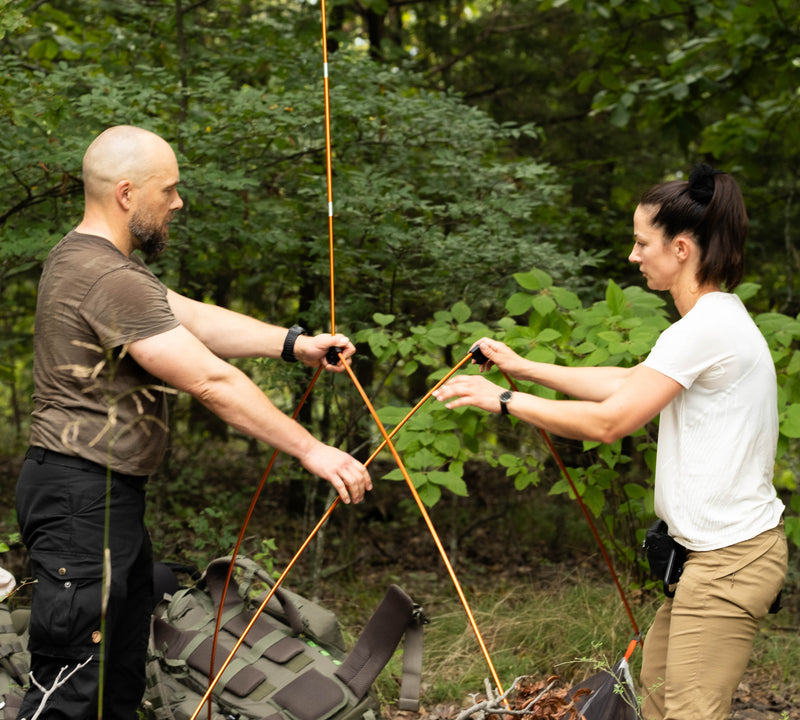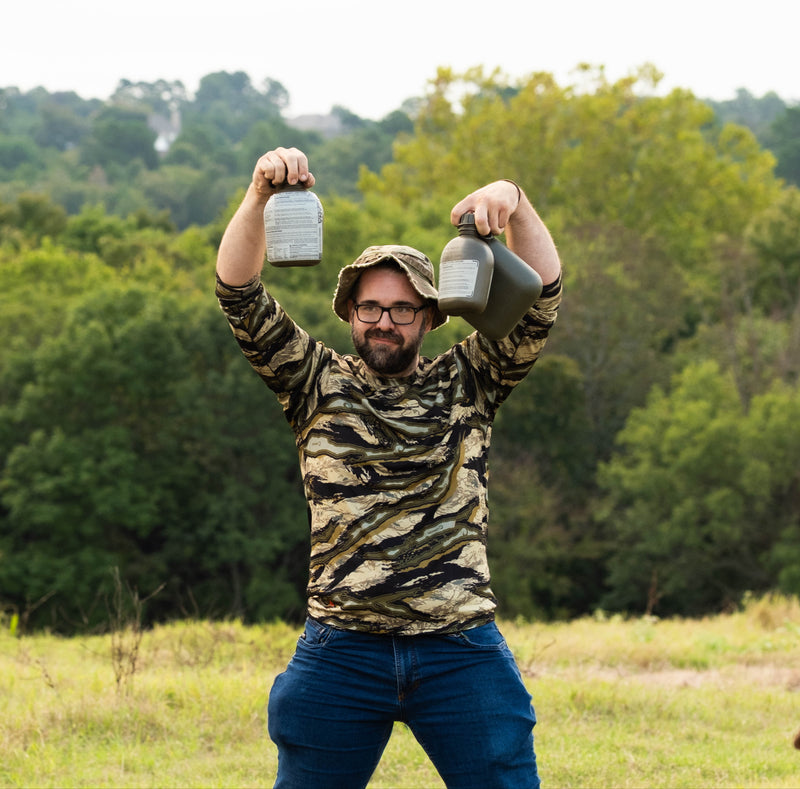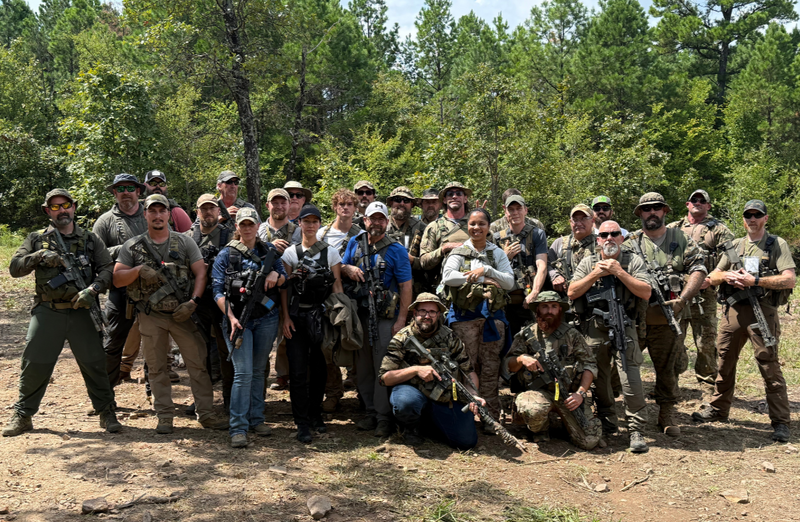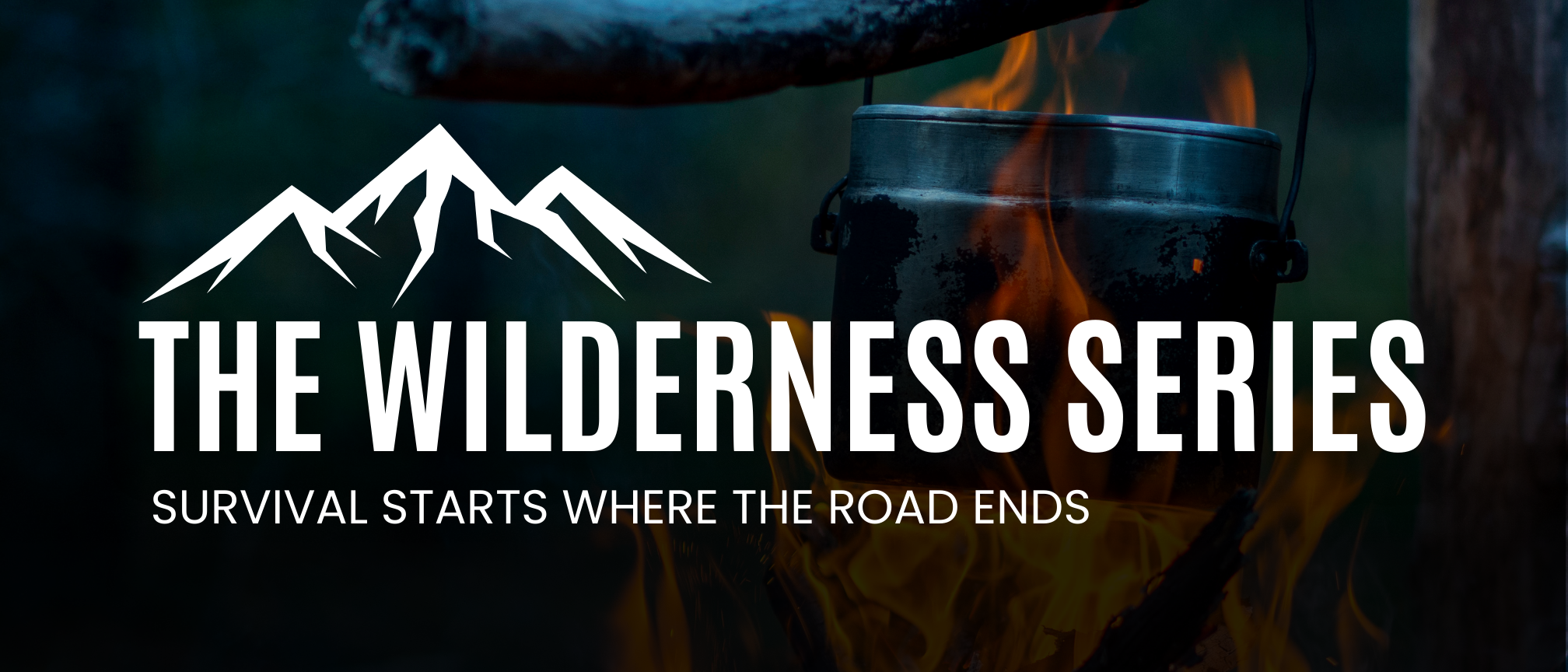
🩸 MASS CASUALTY RESPONSE 🛡️ ACTIVE SHOOTER MEDICAL RESPONSE ➕ TACTICAL CASUALTY CARE UNDER FIRE
WILDERNESS RESPONDER MEDICINE 72-HR CLASS
Taught to the ECSI 32 hour Comprehensive Wilderness Medicine Standard, this three day immersive training covers everything from bleeding control and airway management to hypothermia treatment, patient packaging, and field evacuation. You will run daytime and nighttime scenarios. You will sleep in the dirt. You will build fires, purify water, construct travois, and signal for rescue.
At the end of this course, you will walk out with the knowledge, gear, and confidence to respond when lives are on the line, no matter where you are.
*Every student will receive a fully stocked Wilderness Responder Training Kit built specifically for this 72 hour course.
IMPORTANT INFORMATION
RM Wilderness Medicine 72 hr Class | May 17th - 19th, 2026
This course is not theory. It is hard skills under stress. Taught to the ECSI 32 hour Comprehensive Wilderness Medicine Standard, this three day immersive training covers everything from bleeding control and airway management to hypothermia treatment, patient packaging, and field evacuation. You will run daytime and nighttime scenarios. You will sleep in the dirt. You will build fires, purify water, construct travois, and signal for rescue.
At the end of this course, you will walk out with the knowledge, gear, and confidence to respond when lives are on the line, no matter where you are.
Every student will receive a fully stocked Wilderness Responder Training Kit built specifically for this 72 hour course. This kit includes all medical gear covered in class and is yours to keep after training. It is valued at over $499 dollars and is one of the most comprehensive Wilderness Responder kits available.
Check the packing list. Lock in your gear. This is real world training for real world emergencies. Be ready. Certification is earned, not given.
Class will be conducted in the vicinity of Spiro, OK exact location will be provided when class starts. Please come to 807 W Broadway St, Spiro, Ok 74959 day one.
Sunday May 17th
Day 1 – Daylight Phase
Sunrise approx 0700 hrs local
Begin Exercise: 0800 hrs
-
0800–1200 hrs – Gear Layout, Infil Patrol, Camp Site Setup
Compass, Area Familiarity, Gear Shakedown -
Lunch Break 1200 hrs – Topic of Discussion: Line Gear & Layering Capabilities
-
1300–1700 hrs – Water Refill, Purification, Fire making & Boiling
Hydration, Waterborne illness threats, signs, symptoms, and treatment.
Review of S-MARCH-E in a Wilderness Setting
Primary & Secondary Assessments: S-MARCH-E, AMPLE, COLDER methods -
Dinner Break 1700 hrs – Topic of Discussion: Foot Care & Individual Mobility
Day 1 – Lowlight Phase
Sunset approx 1900 hrs local
Resume Exercise: 1800 hrs
-
1800–2000 hrs – Daylight Vitals & Patient Package and Transport
-
2000–2200 hrs – Lowlight / No Light Vitals & Patient Package and Transport
Rest Break: 2200 hrs
Monday May 18th
Day 2 – Daylight Phase
Sunrise approx 0700 hrs local
Begin Exercise: 0800 hrs
-
0800–0900 hrs – Massive Bleeding
Commercial & field-expedient TQs; Wound Packing; Lacerations -
0900–1000 hrs – Airway & Respiratory
Commercial & field-expedient chest seals; Breathing sounds; Respiratory rate; Distended airway; Tension pneumothorax diagnosis and treatment; HAPE -
1000–1100 hrs – Circulation, Head Injury
Vitals, Pulses, Pupil dilation, C-spine stabilization -
1100–1130 hrs – Hypothermia
Signs, Treatment, Mitigation -
1130–1200 hrs – Expose, Evaluate, Evacuate, Elevate
Thorough patient assessments; Hike or helicopter; Patient hand-off
Area Familiarity: Where am I? Where can I land a helo? How do I signal a helo? How do I get from here to there? -
Lunch Break 1200 hrs – Topic of Discussion: Review S-MARCH-E, AMPLE, COLDER
-
1300–1700 hrs – Scenarios 1–8 (180–240 mins total runtime)
-
Scenario 1: Abdominal Pain – 20 mins
-
Scenario 2: Trauma, Intra-Abdominal Pain, Open Fracture – 40 mins
-
Scenario 3: Fractured Radius & Ulna – 20 mins
-
Scenario 4: Fractured Radius, Ulna, Clavicle – 20 mins
-
Scenario 5: Chest Pain – 20 mins
-
Scenario 6: High Altitude Pulmonary Edema (HAPE) – 20 mins
-
Scenario 7: Hypothermia / Submersion Injury – 20 mins
-
Scenario 8: Lightning Injury – 20 mins
-
-
Dinner Break 1700 hrs – Topic of Discussion: The Four Types of Shock & Treatment
Day 2 – Lowlight Phase
Sunset approx 1900 hrs local
Resume Exercise: 1800 hrs
-
1800–2200 hrs – Scenarios 9–16 (200–240 mins total runtime)
-
Scenario 9: Seizure – 20 mins
-
Scenario 10: High Altitude Cerebral Edema (HACE) – 40 mins
-
Scenario 11: Femur & Wrist Fractures, Package & Transport – 40 mins
-
Scenario 12: Dislocated Shoulder – 20 mins
-
Scenario 13: Anaphylactic Reaction to Food – 20 mins
-
Scenario 14: Hypoglycemia requiring Oral Glucose & Evacuation – 40 mins
-
Scenario 15: Ankle Fracture Requiring Splinting – 20 mins
-
Scenario 16: The Leader is Dead… Now What? – 20–40 mins
-
Rest Break: 2200 hrs
Tuesday May 19th
Day 3 – Daylight Phase
Sunrise approx 0700 hrs local
Begin Exercise: 0800 hrs
-
0800–0900 hrs – Scenario Review & AAR
-
0900–1000 hrs – CAS/MEDEVAC
Review C-spine stabilization, Moving the patient, Quick litters -
1000–1100 hrs – Travois Construction & Demonstration
-
1100–1200 hrs – Emergency Signaling
Fires, Gunshots, Signal mirror, Radio, GPS, VS-17 panel, Chemlights – motion and contrast -
Lunch Break 1200–1300 hrs – Topic of Discussion: Open Q&A Prior to Testing
-
1300–1600 hrs – Break Camp, Police Trash, Exfil, Event AAR
-
1600–1700 hrs – Final Exam
EndEx: 1700 hrs
General Rules
-
No Alcohol
-
No Smoking
-
No Live Ammunition
-
Quiet Time 2200–0600 hrs
-
No Trash – Pack out EVERYTHING you pack in
THERE WILL BE A LAYOUT: If you do not have the minimum packing list contents with you, you will not proceed with the training event. No refunds will be issued on the grounds of “I forgot it at home” or “I didn’t know”.
Minimum Packing List
Shelter & Sleep
-
Sleep Kit: ground pad, sleeping bag and/or blanket, mylar bivvy sack
-
Shelter: poncho and/or tarp, or small tent
-
Rainjacket or dedicated poncho
-
Large heavy duty trash bags, minimum 2
Water & Food
-
Water, 1 gallon minimum, Nalgene or Canteens (filled before class)
-
Metal cup or single-wall (uninsulated) vessel
-
Calories for 72 hours
Fire & Light
-
Firemaking kit: ferro rod, lighter, tinder (waterproofed)
-
Headlamp and 1 set spare batteries
-
Handheld flashlight and 1 set spare batteries
-
Chem-lights, minimum 2
Navigation & Signaling
-
Compass
-
Signal Mirror (Starflash or similar)
-
Small binos or monocle
-
FRS/GMRS handheld radio & charged spare battery
Medical
-
IFAK w/ TQ
-
Triangle Bandages, minimum 2
-
Cohesive Bandages, minimum 2
-
BooBoo kit, OTC meds, and Anti-Diarrheal meds
-
Prescription meds, if required (5-day supply minimum)
-
Nitrile gloves, 10 pair minimum
Tools & Hardware
-
Knife – fixed blade, 3.5” to 5” blade recommended
-
Small sharpening stone
-
Folding saw – 6–8” blade
-
E-tool or Spetznaz shovel
-
12 or 10 AWG wire, 5–10 feet
-
Cordage – 100’ paracord (550 cord) and 1 roll waxed bankline
-
25+ feet ⅜”–½" diameter climb-rated rope
-
Locking carabiner, professional grade, minimum 2 (Petzl or other reputable manufacturer)
Clothing & Personal Gear
-
Complete change of clothes in dry bag (shirt, pants, underwear, warming layer)
-
Spare socks in Zip-Lock bag, minimum 2
-
Suitable footwear
-
Toilet paper in ziplock bag or dry-bag
-
Hand sanitizer, bar of soap, and wipes
Field Admin
-
Carpenter’s pencil, minimum 2
-
Notebook and writing utensils (recommend Write-in-Rain and Sharpie products)
PPE (Personal Protective Equipment)
-
Clear safety glasses
Adhesives & Tape
-
Electrical tape, 1 roll minimum
-
2” fabric tape, 1 roll minimum
Recommended (Not Required)
-
Long gun & chamber flag (must have sling, optic, and weapons light)
-
Magazines for long gun, minimum 3 EMPTY
-
Knee pads (or pants with built-in knee pads)
-
Bug spray
-
Mosquito netting
-
Sunscreen
-
Instant coffee and/or tea bags
-
Oral Rehydration Salts
-
Gorilla Tape – Large Roll
-
Camp stool or seat
-
Mechanix or leather gloves
-
Tinted safety glasses
The minimum packing list and recommended gear list will be provided to you via email & available on the Wilderness Responder Student Portal.
Wilderness Responder Training Kits for the 72hr course will be included with your purchase. This kit will provide all medical gear covered in the class and will be yours to take home after class. The Wilderness Training Kit is over a $499 value. (The items in the Training Kit do not count towards your minimum packing list.)
*IMPORTANT*
If you have pre-existing conditions AND/OR require prescription medications, please email us at Training@refugemedical.com so we can be prepared in the case of a medical emergency. ***Please note that you are required to bring 5 days worth your prescription medications. This will be part of your Gear Check.
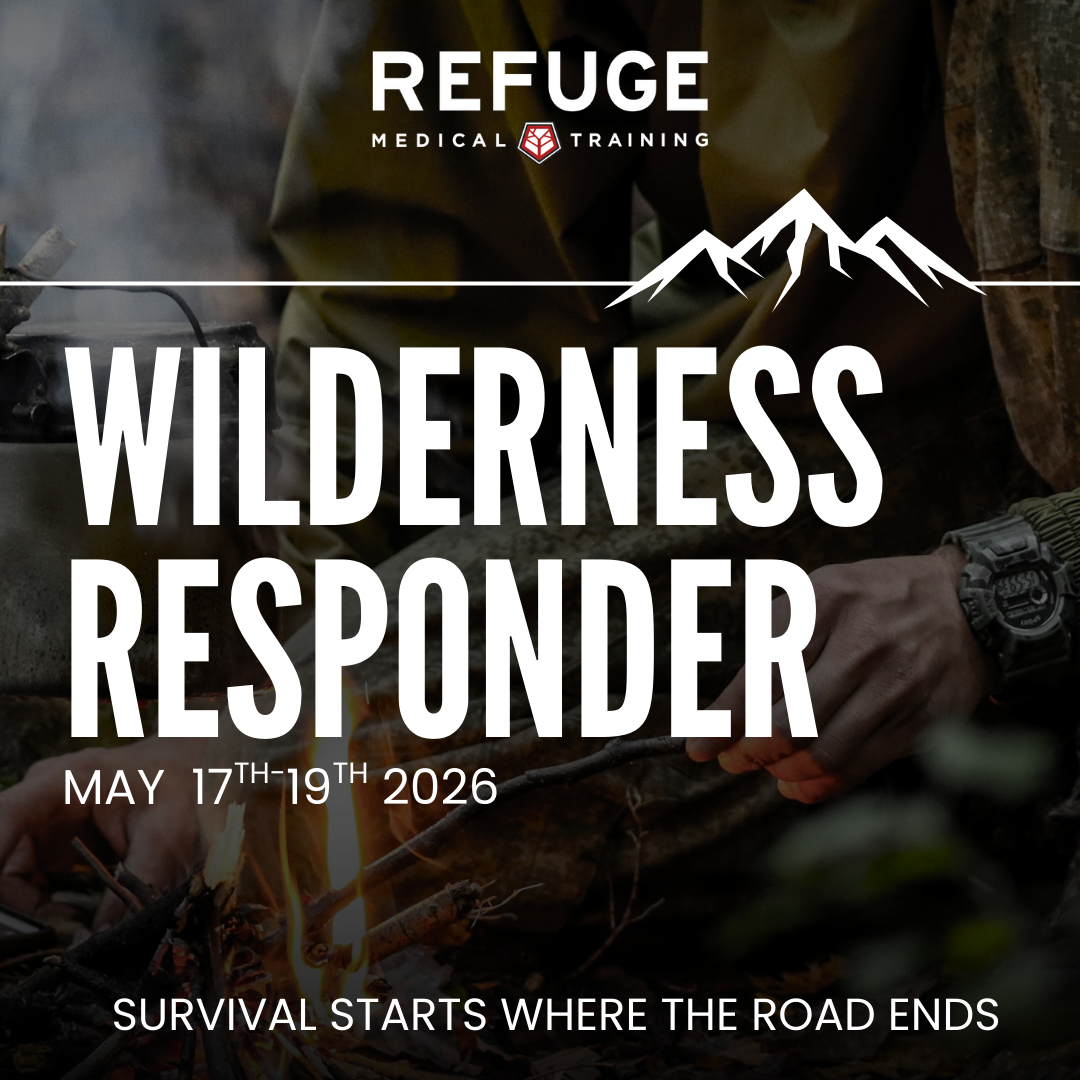
"As a civilian, you absolutely cannot buy better training than Refuge offers. This course was incredible. 3 days in the wilderness learning crucial life saving skills. While also testing your basic medical and survival skills. The instructor cadre is absolutely amazing. So much knowledge and experience on display. Not only that, they're invested in your success. I've been to plenty of training courses, where the instructor gets a paycheck rather you gain anything or not. Refuge builds you up. They take the time to encourage and help individual students. You really can't put a price tag on this experience..."
★★★★★
William Q.
